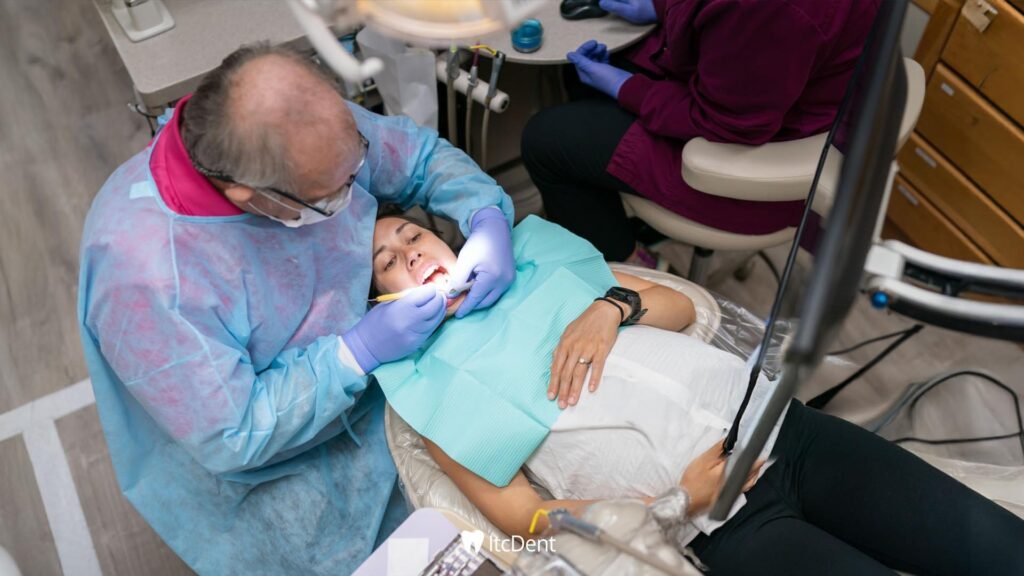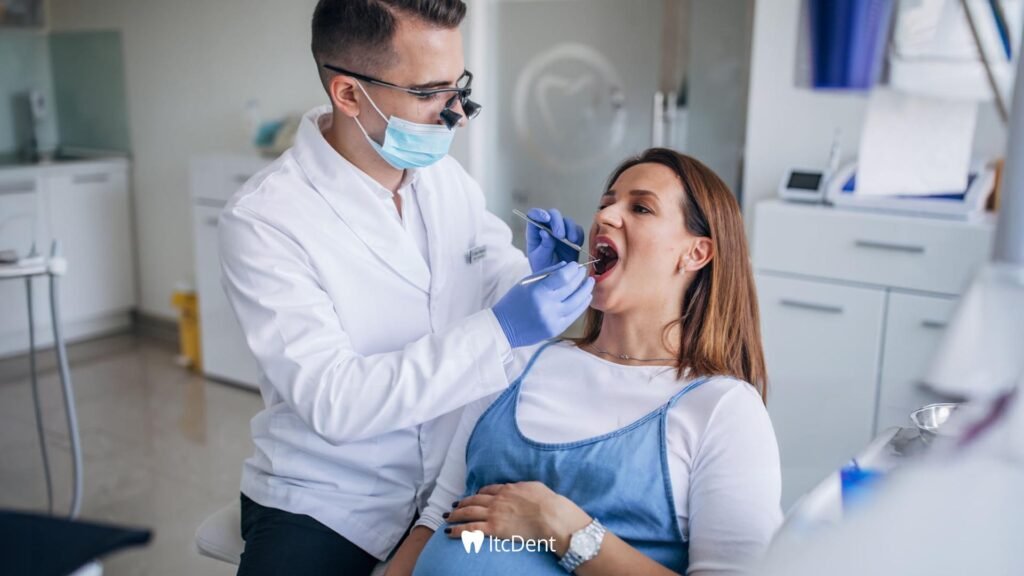How to Get Dental Treatment While Pregnant?
Pregnancy is one of the most special, exciting, and also most sensitive times in a woman’s life. Expectant mothers must prioritize not only their own health but also the health of the baby they will bring into the world. The daily changes in their bodies, the increasing sense of responsibility, and the excitement of motherhood directly impact many aspects, from lifestyle to eating habits. However, there’s one aspect many expectant mothers overlook: dental and oral health.
The intense hormonal changes, changes in the immune system, and changes in diet experienced during pregnancy can lead to various problems with teeth and gums. Bleeding gums, sensitivity, cavities, and gingivitis are common complaints during this period. This raises an important question for expectant mothers: “Can dental treatment be performed during pregnancy, and if so, which methods are safe?”
The answer to this question is actually more comprehensive than you might think. While dental treatments aren’t completely forbidden during pregnancy, certain conditions and the right timing are crucial. There are methods that can be implemented without jeopardizing the health of both mother and baby.
Why Is Dental Health So Important During Pregnancy?
Pregnancy is a period of significant changes in the expectant mother’s body. The rise in estrogen and progesterone hormones, in particular, not only prepares the body for birth but also directly affects oral and dental health. With these elevated hormone levels, gums become more sensitive, more prone to inflammation, and can react violently to even the slightest trace of bacterial plaque. This is why “pregnancy gingivitis,” a common condition during pregnancy, occurs. This condition typically begins in the second and third months of pregnancy and manifests itself with bleeding, swelling, and redness of the gums.
If left untreated, the condition can become more serious. Advanced gingivitis can lead to receding gums, loose teeth, and even tooth loss. So, what may initially seem like a minor problem can be both health and psychologically challenging for expectant mothers in the following months.

Another factor that threatens oral health during pregnancy is nausea and vomiting. Vomiting, which is particularly common in the first trimester, causes stomach acid to remain in the mouth for extended periods. This erodes tooth enamel, making teeth more sensitive and prone to decay. Furthermore, some expectant mothers experience increased cravings for sweet and carbohydrate-rich foods during this period. Frequently consuming sugary foods can increase acidity in the mouth and cause cavities to multiply rapidly.
The most important point to remember here is this: Oral and dental health is a concern not only for the expectant mother but also for the baby. Research shows that untreated gum infections can be linked to premature birth and low birth weight babies. In other words, even a small, unnoticed infection in the mouth can negatively impact the health of both mother and baby.
Is Dental Treatment Safe During Pregnancy?
Many expectant mothers are hesitant about dental treatments during pregnancy. However, dental treatments performed at the right time and with the right methods are safe for both mother and baby.
The key here is knowing which treatments can be performed at which time.
First trimester (1st trimester): This is the period when the baby’s organ development is most intense. Therefore, non-urgent dental treatments are postponed if possible. However, simple and safe procedures can be performed in cases causing severe pain or inflammation.
Second trimester (2nd trimester): This is the most suitable time for dental treatments. Because the baby’s organ development is largely complete, risks are reduced. Fillings, dental scaling, and some extractions can be safely performed during this period.
Last trimester (3rd trimester): It becomes difficult for expectant mothers to sit in the dental chair for extended periods. Furthermore, because labor is approaching, some treatments may be postponed. However, emergency interventions can still be performed.

What Dental Treatments Can Be Performed Safely During Pregnancy?
There’s a misconception that dental treatments are completely forbidden during pregnancy. However, the opposite is true. Delaying certain dental treatments can jeopardize the expectant mother’s health and negatively impact the baby’s development. If left untreated, dental infections can cause both intense pain and serious health problems. Therefore, with the right timing and the right methods, many treatments can be performed safely. Here are the procedures that expectant mothers are most curious about:
Scaling (Scaling)
Gum problems are common during pregnancy, so scaling is crucial. Regularly performed, this procedure soothes the gums, reduces bleeding, and prevents inflammation. Contrary to popular belief, scaling does not harm the baby; on the contrary, it contributes to a healthy oral environment.
Filling Treatment
Dental decay can progress more rapidly during pregnancy. Therefore, it is important to have a filling done immediately when a decay is detected. Early intervention prevents further damage to the tooth, leading to root canal treatment or extraction. Experts state that fillings can be safely performed during the second trimester, between the 4th and 6th months of pregnancy. This is the most suitable time for both mother and baby.
Tooth Extraction
Tooth extraction is generally preferred in cases of necessity. For example, if there is a severe infection in the tooth and other treatments cannot be saved, extraction may be unavoidable. The crucial point here is that the local anesthetic used is suitable and safe for pregnancy. Collaboration between the dentist and obstetrician makes the process much safer.
Root Canal Treatment
Severe toothaches or advanced infections are among the most challenging situations during pregnancy. In such cases, root canal treatment can and should be performed. An untreated infection puts both the expectant mother and the baby at serious risk. Root canal treatment, just like fillings, is one of the procedures generally recommended to be performed in the second trimester.
Antibiotic and Medication Use
Drug use during pregnancy is rightfully approached with greater caution. However, in some cases, antibiotic use is unavoidable. For example, if there is a severe infection, appropriate antibiotic treatment can be initiated to protect both mother and baby. The critical point here is that the medication must be administered with the approval of a dentist and obstetrician. Penicillin and its derivatives are generally considered safe during pregnancy. However, no medication should be used without a doctor’s supervision.

Can X-rays be Taken During Pregnancy?
Dental procedures may sometimes require X-rays. X-rays are postponed as much as possible during pregnancy. However, if there is an emergency, X-rays can be taken using a lead apron and a low-dose dose. This prevents harm to the baby. While X-rays are not completely prohibited, they are not recommended unless absolutely necessary.
Can Anesthesia Be Used During Pregnancy?
Local anesthesia is frequently used in dental procedures. Anesthesia can be administered during pregnancy, using the appropriate dose and the correct medication. Expectant mothers do not need to worry about this. The important thing is that the doctor is aware of the pregnancy and performs the procedure correctly.


